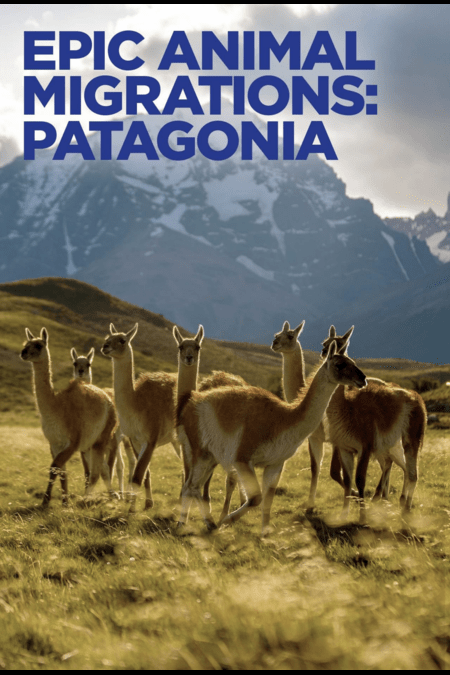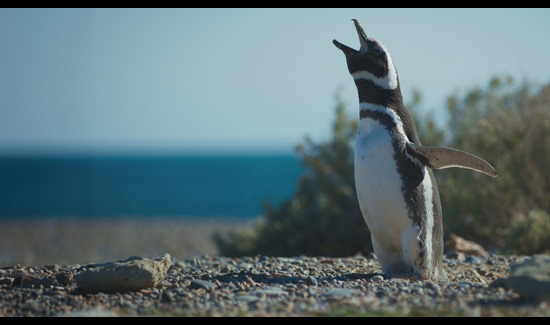(courtesy IMDb)
Documentaries in our hyper-sensationalised digital age have a lot to contend with.
With almost everything braying at us with unrelenting 24/7 intensity, you have to be loud and intense and a little tabloidy to cut through; fair enough in one sense – if everyone else is yelling, you have little choice but to match, and exceed, their volume.
The fear is that if you don’t, no one else will actually listen, a legitimate fear in some ways but one that provokes many modern documentary makers to grab their megaphone, flip up the volume, amp up the narrative stakes and keep upping the ante so we’ll stay glued to the story they’re trying to tell.
Thankfully Epic Animal Migrations: Patagonia doesn’t go down the shouty, noisy route, content to let its narrator tell the story of the engaging patterns of life at the bottom of South America in something approaching normal volume and without the huckster intensity of a street salesperson begging you to try their wares.
It acts as if the rhythms and quiet patterns of life are enough of an attraction on their own, and they are, especially with a landscape as epically beautiful and awe-inspiring as this one, and it allows us to slip into the seasonal ebb and flows of animals coming and going as nature and the weather dictates.
Thus we see for instance the guanaco, a camelid whose relative is the vicuña, moving from the high mountains in winter down to the plains where food is relatively abundant and they can get enough food to stay alive through what is a very challenging season.
They’re more at risk on the open plains but gather in super-herds made up of myriad small guanaco families hoping that the old adage of safety in numbers will protect them from predators such as the puma which is eager to capture enough prey to sustain its three increasingly hungry cubs.
It’s fascinating watching the guanaco and puma play out their respective seasonal cycles, inextricably linked by the fact that one is prey, one is predator and that their coming together is borne of a need to survive in both instances.
The only downside to the way Epic Animal Migrations: Patagonia presents this intriguing tale of survival and life doing its thing is that goes down the old 12-months in the life of … route which is an understandable way to approach things but which feels a little limp and flat and been-there-done-that this time around.
The problem partly is that the aforementioned narrator, while thankfully eschewing the screaming shrill of many modern documentarians, doesn’t really seem engaged with the subject matter; it all feels very paint-by-numbers, tick the boxes affair and while it’s easy enough to listen to, it’s hardly wildly thrilling either.
(courtesy Paramount+)
Part of the problem comes down to the fact that the script lacks any real imagination.
It might seem wildly unfair to be appreciative of the fact that Epic Animal Migrations: Patagonia doesn’t go down the scream-yell-tabloidy-ranting route of many modern docos, and then accuse it of playing it too safe but that’s unfortunately where it lands.
It feels like a weird knockoff of the great Sir David Attenborough BBC special series which give us wondrously expansive landscapes, a wholly immersive storyline that supersizes nature but not so much that it becomes a loud caricature of itself, and a thoughtfully passionate narration which feels truly excited by the subject matter it is covering.
All of those elements are, and they add up to an enjoyable enough documentary that shines a fascinating light on life in Patagonia from the already remarked upon guanacos and pumas to the sea lions and orcas who are also caught in an unending web of life giving and taking.
There’s nothing un-engaging about the subject matter since how can you not marvel at how wondrous life is and how it unceasingly keeps going, year after year, with so much coming against it?
That is compelling enough all on its own, and one of the strengths of Epic Animal Migrations: Patagonia is that it lets these stories stand on their own two, or as it were, four feet (or flippers of varying numbers).
It recognises, quite rightly, that nature is enough of an attraction that it doesn’t needs copious bells and whistles to hold our attentions; points there for that, at least.
Where it goes wrong, and not terminally so since Epic Animal Migrations: Patagonia is still quite lovely and enjoyable to sit through, is that it doesn’t try to find a story unique to this area.
Oh, there is talk of the harshness and frigidity of the environment, and its life-challenging position at the end of the world – unless, of course, you live there and it probably feels quite central to everything really – and how animals must work hard to stay alive and how this involves the great movements of the title, but even the remarkable story of the magellanic penguins, who spend many months of each apart before combining in a half-million strong nesting colony, somehow fails to truly seize the imagination.
It’s a pity because the story of life on earth is never dull, and while Epic Animal Migrations: Patagonia does play up the wonder and grandeur and majesty of it all, it never really stokes the fire to the point where you wish there was episode after episode waiting for you, and while the story of each of the animals featured are never less than thrilling, the delivery style lacks a certain something leaving this doco feeling sweet but uneventful and destined to never ascend to the great heights of other nature documentaries of the modern age.

